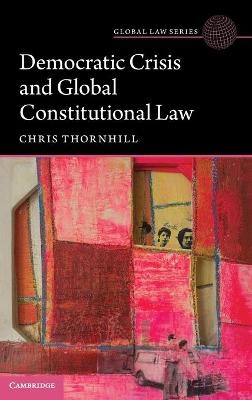
Democratic Crisis and Global Constitutional Law
Seiten
2021
Cambridge University Press (Verlag)
978-1-108-49608-7 (ISBN)
Cambridge University Press (Verlag)
978-1-108-49608-7 (ISBN)
This book explains the current weakness of democratic polities by examining deep paradoxes in constitutional democracy. It argues that democracy is frequently exposed to crisis because the terms in which it is promoted and justified allow anti-democratic movements, typically with a populist emphasis, to take shape and flourish.
Democratic Crisis and Global Constitutional Law explains the current weakness of democratic polities by examining antinomies in constitutional democracy and its theoretical foundations. This book argues that democracy is usually analysed in a theoretical lens that is not adequately sensitive to its historical origins. The author proposes a new sociological framework for understanding democracy and its constitutional preconditions, stressing the linkage between classical patterns of democratic citizenship and military processes and arguing that democratic stability at the national level relies on the formation of robust normative systems at the international level. On this basis, he argues that democracy is frequently exposed to crisis because the normative terms in which it is promoted and justified tend to simplify its nature. These terms create a legitimising space in which anti-democratic movements, typically with a populist emphasis, can take shape and flourish.
Democratic Crisis and Global Constitutional Law explains the current weakness of democratic polities by examining antinomies in constitutional democracy and its theoretical foundations. This book argues that democracy is usually analysed in a theoretical lens that is not adequately sensitive to its historical origins. The author proposes a new sociological framework for understanding democracy and its constitutional preconditions, stressing the linkage between classical patterns of democratic citizenship and military processes and arguing that democratic stability at the national level relies on the formation of robust normative systems at the international level. On this basis, he argues that democracy is frequently exposed to crisis because the normative terms in which it is promoted and justified tend to simplify its nature. These terms create a legitimising space in which anti-democratic movements, typically with a populist emphasis, can take shape and flourish.
Chris Thornhill is Professor in Law at the University of Manchester. His publications include A Sociology of Constitutions (2011), A Sociology of Transnational Constitutions (2016) and The Sociology of Law and the Global Transformation of Democracy (2018). His works have been translated into many languages, including Chinese, Japanese, Portuguese, Russian and Spanish. He is a member of the Academia Europaea.
Introduction; 1. Democratic Subjects and Social Process; 2. Democracy and Militarization; 3. Democracy and Global Law; 4. Populism as Misunderstood Democracy; Conclusion.
| Erscheinungsdatum | 20.01.2021 |
|---|---|
| Reihe/Serie | Global Law Series |
| Zusatzinfo | Worked examples or Exercises |
| Verlagsort | Cambridge |
| Sprache | englisch |
| Maße | 160 x 235 mm |
| Gewicht | 550 g |
| Themenwelt | Geisteswissenschaften ► Philosophie |
| Recht / Steuern ► Allgemeines / Lexika | |
| Recht / Steuern ► EU / Internationales Recht | |
| Sozialwissenschaften ► Soziologie | |
| ISBN-10 | 1-108-49608-3 / 1108496083 |
| ISBN-13 | 978-1-108-49608-7 / 9781108496087 |
| Zustand | Neuware |
| Informationen gemäß Produktsicherheitsverordnung (GPSR) | |
| Haben Sie eine Frage zum Produkt? |
Mehr entdecken
aus dem Bereich
aus dem Bereich
wie Philosophie uns helfen kann, unseren Weg zu finden
Buch | Hardcover (2023)
dtv Verlagsgesellschaft
CHF 39,90
mit Kant zur medialen Mündigkeit
Buch | Softcover (2024)
Verlag Herder
CHF 27,95


